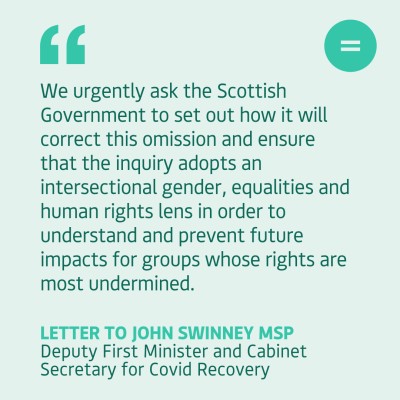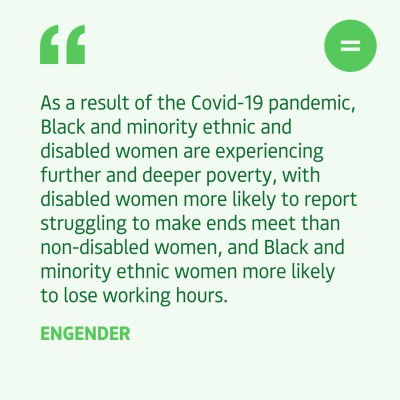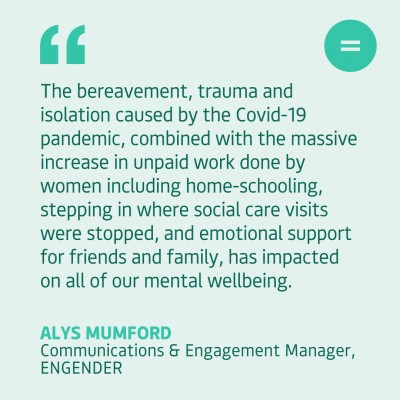Engender blog
Engender joins other orgnisations dismayed at exclusion of equality and rights in Scottish Government’s Covid-19 inquiry
 Today, we joined with 26 organisations working for equality and human rights in Scotland to write to John Swinney expressing our “dismay” and “deep concerns” following the publication of the Scottish Government’s Terms of Reference for a public inquiry into the handling of the COVID-19 pandemic in Scotland.
Today, we joined with 26 organisations working for equality and human rights in Scotland to write to John Swinney expressing our “dismay” and “deep concerns” following the publication of the Scottish Government’s Terms of Reference for a public inquiry into the handling of the COVID-19 pandemic in Scotland.
Despite clear evidence raised by equalities groups and by Government itself that that the pandemic has had a greater impact on certain groups of people, the Terms of Reference as published make no reference to equality or human rights impacts stemming from the pandemic. Throughout the document, there is no mention of women, Black and minority ethnic communities, disabled people, LGBT+ People, older people, young people persons subject to No Recourse to Public Funds, and other groups who experienced the brunt of the pandemic.
Eilidh Dickson Engender's Policy and Parliamentary Manager, said:
“Since March 2020 women have been experiencing poorer physical and mental health, increased levels of unpaid work, loss of paid work, greater reliance on state support, insecure housing, and increased levels of gender-based violence. Women who are further marginalised because they are part of other oppressed groups, such as women of colour, LB+ and trans women, single mothers, disabled women and primary and secondary carers, have been exposed to even more acute poverty, violence, and exclusion.
For the Scottish Government to have ignored all of this in their Terms of Reference for the Covid-19 inquiry is disappointing, and presents real concerns about the success of the inquiry if it is falling at this first hurdle”
Exploring the impact of Covid-19 on women's equality in Scotland

Over the past eighteen months, we’ve seen how the inequalities that existed before Covid-19 have been magnified and intensified by the pandemic. Covid-19 has disproportionately impacted women both at work and at home, with UN Women estimating that the impact for women’s equality could mean a rollback of 25 years of progress on women’s rights.
Women in Scotland face a reduction in paid work both due to increased caring responsibilities and being concentrated in industries hardest hit by the pandemic like hospitality and nursing, which also places women at increased risk of exposure to Covid-19. There is a widening gender gap in unpaid work as women are expected to pick up the slack created by widespread reduction in social care packages, made even more difficult by the persistent inadequacy of social security provision, which has been further compounded by the recent £20 cut in Universal Credit.
Throughout the past year, we’ve joined with organisations across the 4 nations of the UK including Close the Gap, the UK Women’s Budget Group, the Fawcett Society, Women’s Equality Network Wales and the Northern Ireland Women’s Budget Group in a polling project to collect survey data on the impact of Covid-19 on women, funded by the Standard Life Foundation and the Joseph Rowntree Reform Trust. We’ve also worked with Close the Gap to produce joint reports highlighting what this data tells us about the impact of Covid-19 on women in Scotland specifically.
CEDAW: how are the UK and Scottish Governments responding to the recommendations?
-400.png)
During the 8th periodic review of the UK from the Committee of the Convention on the Elimination of All Forms of Discrimination Against Women, the UN Bill of Rights for women, several recommendations were made to the UK Government to improve women's equality and rights (find out more about the CEDAW process here).
These recommendations included three specific areas that the UK is meant to feedback their progress on – incorporation of CEDAW, the impacts of Brexit, and an oversight mechanism for women’s participation in CEDAW at UK level. The UK Government has submitted its progress report on these areas, but it didn’t consult with any of the organisations who have been involved with the CEDAW process at UK level (Engender, the Women's Resource Centre, the Northern Ireland Women’s European Platform, and Women’s Equality Network Wales), and it’s fair to say they were wearing their rose-tinted glasses while writing their report.
Telemedical abortion services: joint letter to Maree Todd MSP, Minister for Public Health, Women's Health, and Sport
-400.png)
Today Engender and the British Pregnancy Advisory Service (BPAS) have, together with 25 women's organisations, human rights bodies, and healthcare providers, written to the Scottish Government asking them to make telemedical abortion services permanent in Scotland.
In March 2020, the Scottish Government provided temporary permission for telemedical early medical abortion care. This ensured that women and pregnant people all over Scotland could continue to access abortion care without travel to a clinic, decreasing their own and clinic staff’s risk of exposure to Covid-19. Our letter asks that this change be made permanent, continuing to provide women with as much choice as possible in accessing abortion care.
Covid-19 and Mental Health
Engender has been working with Close the Gap, and other women's organisations across the UK, to carry out some polling work to see how Covid has impacted on women's lives. We published the our first findings from this study - focusing on the impact on women with childcare responsibilities - back in March and you can read it here. Our next report looks at the impact of the Covid-19 pandemic on women's health.

This week marks Mental Health Awareness Week, in a year which has seen women's mental health be challenged like never before. The bereavement, trauma and isolation caused by the Covid-19 pandemic, combined with the massive increase in unpaid work done by women including home-schooling, stepping in where social care visits were stopped, and emotional support for friends and family, has impacted on all of our mental wellbeing.
As part of our work for a gendered recovery, we carried out a survey on the impacts of COVID-19 developed alongside Close the Gap, the UK Women’s Budget Group, Fawcett Society, Women’s Equality Network Wales, and Northern Ireland Women’s Budget Group. The survey was carried out by Survation between 18-27 February 2021 across the four nations in the UK.
Downloads
 Engender Briefing: Pension Credit Entitlement Changes
From 15 May 2019, new changes will be introduced which will require couples where one partner has reached state pension age and one has not (‘mixed age couples’) to claim universal credit (UC) instead of Pension Credit.
Engender Briefing: Pension Credit Entitlement Changes
From 15 May 2019, new changes will be introduced which will require couples where one partner has reached state pension age and one has not (‘mixed age couples’) to claim universal credit (UC) instead of Pension Credit.
 Engender Parliamentary Briefing: Condemnation of Misogyny, Racism, Harassment and Sexism
Engender welcomes this Scottish Parliament Debate on Condemnation of Misogyny, Racism, Harassment and Sexism and the opportunity to raise awareness of the ways in which women in Scotland’s inequality contributes to gender-based violence.
Engender Parliamentary Briefing: Condemnation of Misogyny, Racism, Harassment and Sexism
Engender welcomes this Scottish Parliament Debate on Condemnation of Misogyny, Racism, Harassment and Sexism and the opportunity to raise awareness of the ways in which women in Scotland’s inequality contributes to gender-based violence.
 Gender Matters in Social Security: Individual Payments of Universal Credit
A paper calling on the Scottish Government to automatically split payments of Universal Credit between couples, once this power is devolved to the Scottish Parliament.
Gender Matters in Social Security: Individual Payments of Universal Credit
A paper calling on the Scottish Government to automatically split payments of Universal Credit between couples, once this power is devolved to the Scottish Parliament.
 Gender Matters Manifesto: Twenty for 2016
This manifesto sets out measures that, with political will, can be taken over the next parliamentary term in pursuit of these goals.
Gender Matters Manifesto: Twenty for 2016
This manifesto sets out measures that, with political will, can be taken over the next parliamentary term in pursuit of these goals.
 Scottish NGO Briefing for UN Special Rapporteur on Violence Against Women
Joint briefing paper for the UN Rapporteur on Violence Against Women.
Scottish NGO Briefing for UN Special Rapporteur on Violence Against Women
Joint briefing paper for the UN Rapporteur on Violence Against Women.

Newsletter
Sign up to receive our newsletter here:
Sign up to our mailing list
Receive key feminist updates direct to your inbox: